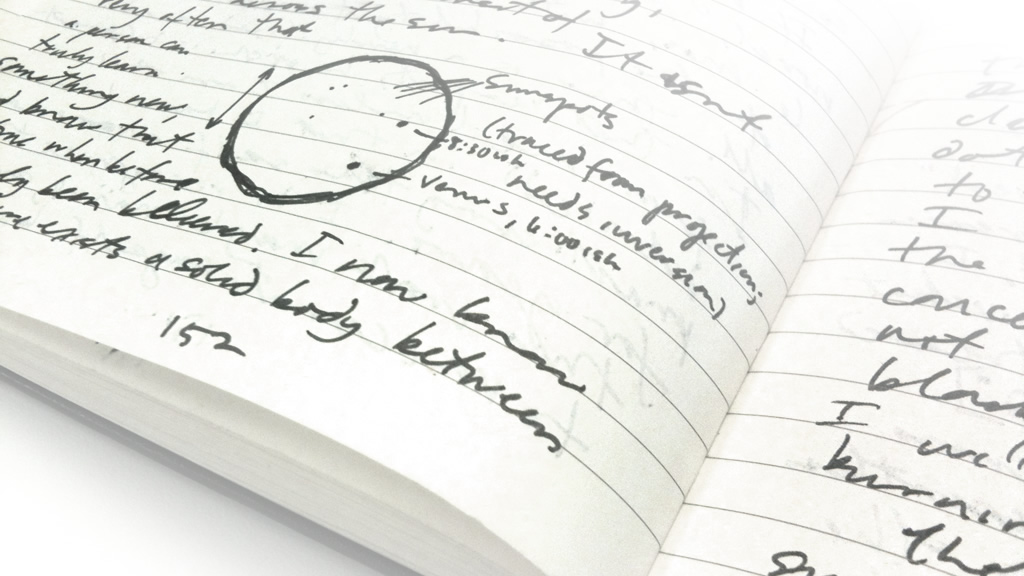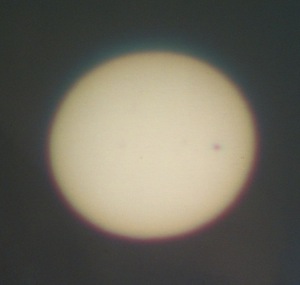Goddess of Knowledge
As I write I am witnessing, first-hand, the transit of Venus across the sun. It isn’t very often that a person can truly learn something new, and know that it is true when before it had only been believed. I now know that there exists a solid body between the Earth and the Sun.

Or do I? What have I really learned here? What do I know now that I didn’t before? It isn’t a new question. Humanity has been wondering what it means to know something since nearly as long as we have known how to write down what we know. An entire field of study has emerged around the topic. The opinions range widely, along a scale whose notches indicate degrees of skepticism. By even asking this question I am placing myself closer to the skeptical end of the spectrum, perhaps near our friend Camus, whose skepticism proved to be ultimately, ironically, and tragically appropriate. He had this to say on knowledge:
Of whom and of what indeed can I say: ‘I know that!’ This heart within me I can feel, and I judge that it exists. This world I can touch, and I likewise judge that it exists. There ends my knowledge, and the rest is construction. 1
Of what indeed, indeed. While Venus has been worshipped for several things, today I looked to her for knowledge, for something new of which I can say that thing. What I learned was this: When I looked at the sun through filtered glasses, or at a projection through a telescope, there was a black, round dot superimposed on a bright white disc, the former being approximately 100 times smaller than the latter, or somewhere in that order of magnitude. I know that other black dots were visible within the disc, much smaller. In the next hour or so when the clouds clear up I am predicting that I will verify the claims of many bright minds that the larger black dot will move with respect to the smaller ones, toward the edge of the disc. Once I witness that, it will be the conclusion of my knowledge concerning the thing. I will not know what any of the black dots are; for that matter, I will not really know what is that burning white disc in the sky.
The rest—the nature of the sun, the orbit of Venus, not to mention her composition, distance, fitness (or lack thereof) for terraformation, age, annual rainfall,2 etc.—all come to me by the way of second-hand accounts. Constructions, as the translator of Camus put it. I say I know them because of the exhaustedly repeated and vetted observations of others, not to mention the many recordings in various forms that I can myself consume—but when I say that I know these things, what I’m really saying is that I trust all of them as facts: I believe in them, and I believe those who profess them.
Fundamentally, is that different from the claims of religion? In terms of repeatability and universal verifiability, sure, but on a fundamental epistemological plane, the experience is identical: one man believes the words and experiences of another. Many religious people have seen their own black dots in front of white discs, and have then proclaimed knowledge of heavenly things.
There are, though, two differences that are important to me. First, the nature of Venus has been observed and recorded by countless individuals for thousands of years. The building of knowledge from generation to generation has worked, well enough that we now capture enough data on the spots of light that were once thought to be stars that we can create visual representations of that data to show that they are actually entire galaxies. There is a flip side to that accretion of knowledge, however; it at the same time has given us wild, nearly incomprehensible theories of atomic structure,3 the evidence of which only the elect few can claim to be able to observe. Are they any different from prophets?
Second, and more important to me, I have never had the spiritual equivalent of what I have empirically witnessed today. The religious tell me that that is the function of some spiritual being who will confirm truths to me, generally in the form of some sort of spiritual emotion. It isn’t the place for this short treatment to go into the challenges around trusting our fickle (although important) human emotions, so I will be content to say that I do not trust emotions as a compass to truth or true living. Okay, then, the religious would persist, It is a matter of faith. Some things are not meant to be known. Perhaps that is true, but consider the alternative way of living: I no longer have to merely believe the words of others when they speak of a solid planet called Venus that is between us and the sun; I now know that something is there. I still have to believe and trust that their calculations are correct that led them to say that that black dot is the same bright wanderer I see at night, but I now have even more of a reason to believe that portion. I have no such sign in religion, I only have the testimonies of others, testimonies that compete with still others’, and sometimes even contradict themselves. These inconsistencies could merely be the fault of humans, granted; if so, where is the consistent god that I can observe as I have this goddess?4

In my efforts to track the movement of the small dot in relationship to the smaller dots, I have fought wind and clouds and the rotation of the earth itself. I have chased the sun to the top of a barn in the orchard behind my house, scurrying up the tapering fruit ladders leaning against it with telescope and notebook under arm, and here I now sit, watching a lovely orange-cream clouded sunset. I was able to get a few more convincing glimpses of the coy Venus, now obviously further along her transit, the darker of the sunspots visible to her left. What a glorious era it is that I, alongside millions of other lowly humans, can project her silhouette, record the image with a device that fits in my pocket, and then climb down from my perch, enter my home, and corroborate what I recorded against the video feed that NASA is supplying from atop a mountain in Hawaii. That, dear world, is knowledge, constructed or not.